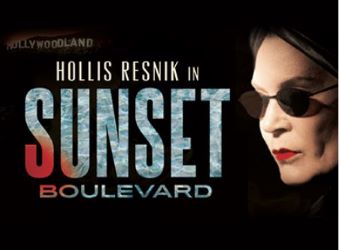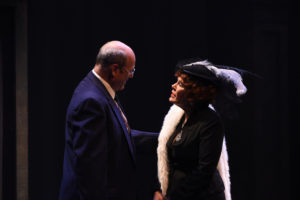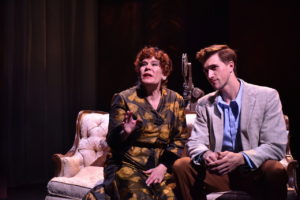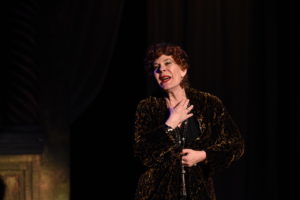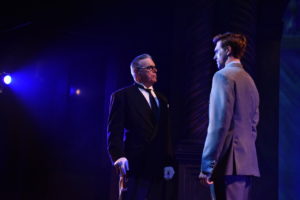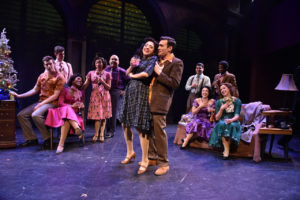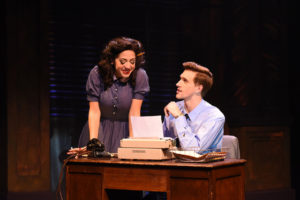UP CLOSE, SHE’S BIGGER THAN
EVEN PEANUT BUTTER
From the start it seemed strange that anyone would make a musical out of a movie that embodies its medium so completely. Yes, the film All About Eve deserved to become the musical Applause. Both were obsessed with the theater. But Billy Wilder’s consummately cinematic 1950 masterpiece was a cautionary tale in black and white. It harked back to the silent screen as it both pilloried and glorified the same larger-than-life celluloid creations that it embraced from every lavish camera angle.
Until Sunset Boulevard, his last big hit until School of Rock, Andrew Lloyd Webber wisely based his musicals on less targeted scripts — T.S. Eliot’s comic verse, P.G. Wodehouse, children’s literature, an Argentine bad girl, the Bible. But Sunset Boulevard, a seven-time Tony winner from 1994, is one of a kind. Drenched in film-noir angst, it’s sardonic with post-war cynicism in its depiction of 50-year-old Norma Desmond’s doomed “return” (she hates “comeback”) and Tinsel Town’s willful ignorance of its living legends.
Norma’s hysterical romance with Joe Gillis, a hack screenwriter who becomes a willing tool in Norma’s second coming, is the American dream gone bonkers. She will turn back the clock; he strikes a Faustian bargain that brings its damnation. (It’s no accident that Norma’s supposedly triumphant return is to be as Salome; by the story’s end she indeed acts out that scenario, with Joe as John the Baptist.)
What it’s not is sentimental: Webber supplies that unwanted ingredient by grafting onto a hard-boiled tale of entrapment, corruption and retribution his aggressively endearing songs. Ironically, Norma’s desire to find “new ways to dream” founders on the simple fact that everything she offers is déjà vu of the worst persuasion.
The original show had a gimmick — a 20-ton, hydraulic-lifted recreation of Norma Desmond’s mausoleum-like mansion at 10086 Sunset Boulevard. A grandiosity in twisted columns, Baroque organ, gold filigree and sepulchral curtains, it was the star of the original production, literally upstaging everyone.
But, as shown in Porchlight Music Theatre’s surprisingly intimate staging, industriously orchestrated by Artistic Director Michael Weber, even with a story this sprawling, less is more. We need our close-ups too.
Not so overwhelming but generous to a fault, Jeffrey D. Kmiec’s supple, slide-in sets also depict a Hollywood sound stage and back lot, Schwab’s drugstore, and the famous Paramount Studio gate, all amplified by Anthony Churchill’s video depicting everything from the Hollywood Hills in the Eisenhower Era to the ripples from the bottom of the fateful swimming pool. Vintage posters announce Paramount’s 1949-50 releases. In Norma’s manse, oil-painting projections depict the diva in happier, as in younger, days.
A waxworks gallery including the urn of a beloved chimp, Norma’s funereal manse is suggested by a grand staircase and the Spanish Baroque furniture of the 1920s. It sepulchrally hosts her deadly, lonely fete, a sumptuous date with Joe alone, later contrasted with a festive and hopeful New Year’s Eve party thrown by Joe’s grifter friends. Live action and film sequences are cleverly interwoven, but, alas, we can only imagine Norma’s gorgeous touring convertible limo, the cause of a sad misunderstanding that implies that the car has aged better than Norma.
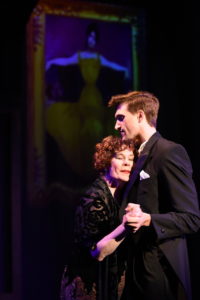 Surrounding, if not sustaining, it all is Webber’s persistent score, easy but lush melodies that loop in relentless repetition, variations on a fertile theme. The good songs, none developed, stand out as much from their insistence as their inspiration, while the book and lyrics by Christopher Hampton and Don Black soar only when they borrow from the film and sink as they try to explain what was clear enough from the camera.
Surrounding, if not sustaining, it all is Webber’s persistent score, easy but lush melodies that loop in relentless repetition, variations on a fertile theme. The good songs, none developed, stand out as much from their insistence as their inspiration, while the book and lyrics by Christopher Hampton and Don Black soar only when they borrow from the film and sink as they try to explain what was clear enough from the camera.
Perfect as its pictures, Weber’s wonderful world of Webber is a wonder of restoration that takes it all, as it must, deadly seriously. At the vortex of the musical’s dueling time trips is Chicago icon Hollis Resnik. Portraying a presence as palpable as any of Norma’s celluloid fantasies, however self-caricatured in Grand Guignol excess, Resnik is every inch a discarded diva who will literally kill for a second chance. Resnik is fully worthy of succeeding Gloria Swanson, let alone Glenn Close or Betty Buckley. Her stand-out features would please every focus as she mugs up a storm (“We didn’t need words; we had faces”) and tears into her show-stopping “As If We Never Said Goodbye” as if no one sang it before. “With One Look” she can win us over and seduce far more than any lousy camera.
Billy Rude makes a handsome, adept Joe, his pessimism balanced against his youthful ambition. It’s a tricky role: By the end he’s thrown away all self-respect and almost courts the tabloid ending that begins the musical. As Norma’s ex-husband/director Max, the arch protector who will not allow “the greatest star of all” to “surrender,” Chicago favorite Larry Adams combines a glorious basso profundo with a magisterial depiction of dogged devotion. Michelle Lauto radiates perfect perkiness as Joe’s more suitable sweetheart. David Girolmo makes a dignified and wonderfully compassionate Cecil B. DeMille. Bill Morey’s costumes are all the right relics.
Everything on this busy, beautiful stage of the Ruth Page Center more than justifies this theatrical validation of a cinematic treasure.
photos by Michael Courier
Sunset Boulevard
Porchlight Music Theatre
Ruth Page Center for the Arts, 1016 N. Dearborn St
Thurs at 7:30; Fri at 8; Sat at 3:30 & 8; Sun at 2 & 6 (check for additional performances)
ends on March 10, 2019 EXTENDED to December 8, 2019
for tickets, call 773.777.9884 or visit Porchlight
